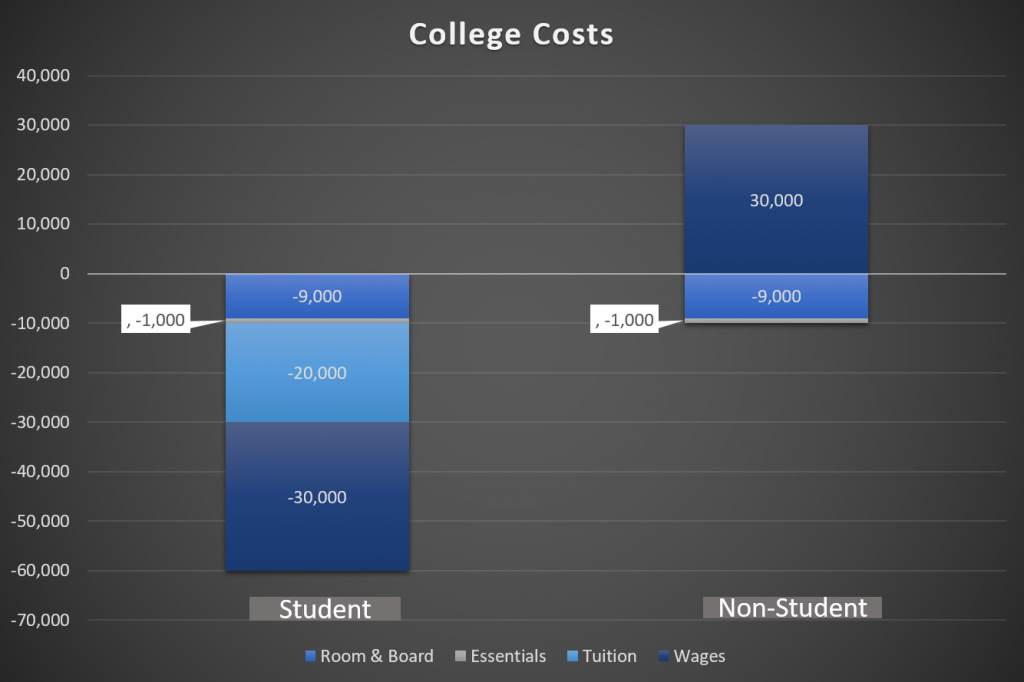In economics, a common topic of discussion is opportunity cost, or the value of your next best option given up when you choose something. It is often used to highlight how people make decisions when faced with limited resources, especially scarcity of time and money.
One common example is a college education. When most people look at the cost of college, they look at the sticker price on the college’s website, which includes room and board, tuition, and a few other odds and ends. Let’s say that ends up being $30,000, with $20,000 for tuition, $9,000 for room and board, and $1,000 for miscellaneous essentials.

The opportunity cost of college would then be the cost incurred by attending, and the cost of forgone income that you would have received for working. If you would’ve made $30,000 working, the cost of college actually comes out to $50,000.
So, how does this relate to going to class? By examining your other options, you can calculate the opportunity cost of your time spent in class. Let’s say I have a 50 minute economics class that meets three times a week. The simplest form of opportunity cost would be monetary. Given the Tacoma minimum wage is $11.15 per hour, and assuming I was able to spend a full hour working, I could make $11.15. Another cost could be your grade in another class. For example, maybe you had an assignment in your IPE class that was worth 1% of your grade and all you had to do to get full credit was to turn something in, but you hadn’t had time to work on it because of poor time management skills. Then, the opportunity cost of going to economics would be 1% of your IPE grade. Or, maybe you need to catch up on sleep in order to be sharp at an important interview, then the opportunity cost of going to economics could be a job, and maybe a future career.
Most professors are aware of these pressures, but believe (often rightfully so) that class is the best way for students to learn the concepts they need to know. So, if you were a professor who was worried about students skipping class, what would you do? You could make attendance part of the student’s grade, which would raise the cost of skipping class. Then, a rational student would only skip if the opportunity cost of not skipping was even higher.
Does it make sense for professors to count attendance as part of your grade? On one hand, the professor has probably taught the class before, and they know how you can get your best grade in their class. On the other hand, your professor doesn’t necessarily know everything you have going on, or if class is the best way for you to learn. This brings us to an interesting question. Who knows best how you should allocate your time, you or your professor?
Maybe we should start asking professors that on syllabus day.
P.S. I’ve spent much of this article providing reasons why someone may skip class, so here I’m going to provide a strategy that I use to urge myself to go to class even when I think the costs are high. One of my most effective strategies for convincing myself to go anyway is to remind myself of the money I’ve already spent on that class. At UPS, if you are taking four units, and paying full tuition, then each class over a semester costs you $5,980. ($23,920 ÷ 4) Then, each class meeting costs $142.38 if you are meeting three times a week. ( $5,980÷ 42) While this seems like a good reason to go to class, you are actually falling victim to the sunk costs fallacy. Sunk costs are costs which have already been paid and can’t be recovered, and should therefore have no impact on your future decisions. By falling for the sunk costs fallacy, you factor those past costs into your decision making, even if it isn’t rational.
P.P.S. Did that convince you?
-Max Coleman
Disclaimer: The views and opinions expressed in this article are those of the author and do not necessarily reflect the position of The University of Puget Sound.
